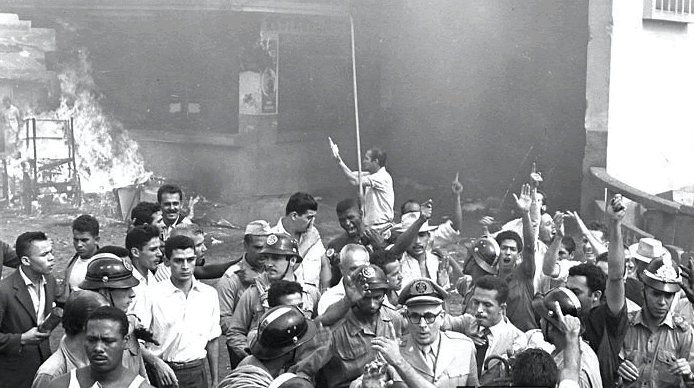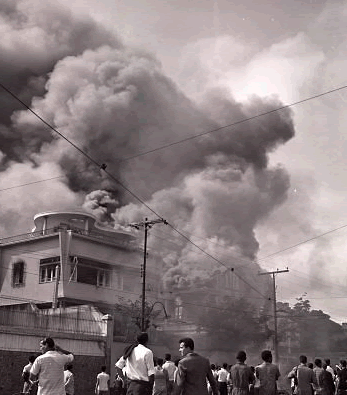 On Monday, February 27th, the prosecuting authorities of Rio de Janeiro attempted to intimidate activists associated with the wider social movement against the increase in public transportation fares. Specifically, political activists were summoned to appear in the 76th police department of Rio de Janeiro, after circulating a video via Internet which propagated the ideas of civil disobedience and rebellion as legitimate means of popular self-defense against the continuous abuse of their lives by the Brazilian State and the capitalist mafia that controls the public transit system, among many other sectors. What seems to have annoyed the authorities the most was the fact that the video contained footage from the historic ‘revolt of the boats’.
On Monday, February 27th, the prosecuting authorities of Rio de Janeiro attempted to intimidate activists associated with the wider social movement against the increase in public transportation fares. Specifically, political activists were summoned to appear in the 76th police department of Rio de Janeiro, after circulating a video via Internet which propagated the ideas of civil disobedience and rebellion as legitimate means of popular self-defense against the continuous abuse of their lives by the Brazilian State and the capitalist mafia that controls the public transit system, among many other sectors. What seems to have annoyed the authorities the most was the fact that the video contained footage from the historic ‘revolt of the boats’.
Revolta das Barcas was a popular uprising which occurred on May 22nd, 1959, after a strike of workers in the waterway transport service of the city of Niterói, state of Rio de Janeiro. At the time, well before the existence of the Rio–Niterói Bridge, the only transport service between Niterói (then state capital) and Rio de Janeiro (capital of Brazil) were these boats that carried approximately 100,000 passengers per day (nearly half Niterói population then). The rebellion, along with six dead and 118 wounded, resulted in the pillaging and burning of both the property and the residence of the family of businessmen who ran the service (the Grupo Carreteiro), and ended with federal intervention and state control of the boats. The same service has been privatized and run since February 1998 by a consortium of private companies, namely Barcas S/A.
In a similar context, police started an investigation regarding the ongoing protests against the increase in fares of the inland waterway transport system, since a new demo has been called for on March 1st, 2012.
Last month, in the area of the main train station Central do Brasil in the city of Rio de Janeiro, the municipal civil guards threatened some activists, who were sharing out protest flyers to passersby, that their material would be confiscated because, ‘according to the organic law of Rio de Janeiro, flyers’ distribution is a crime’.
Since we speak of laws, there is also a draft bill regarding the 2014 FIFA World Cup, according to which whoever ‘causes panic for ideological reasons’ may be sentenced from 15 to 30 years of imprisonment, whoever ‘violates, blocks or hinders access to web pages, informatics systems or data banks used by the events organization’ may be sentenced from 1 to 4 years of imprisonment, while going on a strike will be forbidden for three months (among other wonders submitted by the draft bill, which can be found here in Portuguese).
The so-called ‘human rights violations’, such as the beating of a student by repressive forces in the University of São Paulo during the eviction of the occupied rectorate on November 8th, 2011, are mere examples of constant (registered or not) state terrorism applied on the people in Brazil. According to the student’s testimony, ‘One of the policemen grabbed me by the neck and hit my head several times onto the floor, in particular the part of the scalp, so that there would be no visible hematomas. Meanwhile, a reporter from the journal O Globo was the first one to get there. When I saw him, I thought he came to my rescue, so I started screaming and saying what was going on. The journalist looked with great disdain and simply left.’
All the above do not consist isolated cases of ‘arbitrariness’ that exceed the limits set by bourgeois democracy. On the contrary, these are only a few incidents of everyday reality in which the real face of the bourgeois democracy is expressed.
Over the course of the last few days, alone, two more evictions (one indirect and another direct) were added. During the morning of Monday, February 27th, another mysterious arson attack hit the Favela da Presidente Wilson in São Paulo, where the fire of speculation consumed 30 more homes and the few belongings of residents. A week before, on February 20th, the prefecture of the city of Curitiba, in the state of Paraná, ordered the demolition of 70 shanties in the industrial area of Bolsão Sabará. Municipal civil guards evicted at least 213 families, while armed repressive forces are patrolling the area ever since, in order to guarantee that it will not be occupied again by people who remain around the evicted land.
What is still surprising, in the communiqués of several organizations and social movements that condemn the crimes of political and economic Power in Brazil, is their need of using pro-democracy and pacifist statements. This strategy of victimization along with the constant rhetoric of ‘human rights violations’, either by non-governmental organizations or reformist political forces, only serves the corporate media propaganda and a perpetual process of social pacification.
Nevertheless, rebellious, yet marginalized voices have started to emerge, suggesting publicly an autonomous popular uprising and an active self-defense through the use of revolutionary violence. Radical struggles against the premeditated massacre for the sake of the 2014 World Cup and the 2016 Summer Olympics, as well as against the plunder of the Amazon rainforest and the social genocide, must be supported at international level. The recent past has shown that flames of revolt can also rise from the territories controlled by the Brazilian State. The workers who started a mutiny in March 2011, when the Jirau hydroelectric dam was torched in the Amazon state of Rondônia, have shown us the way.


